Only Half Of Iran's Gas Stations Back To Normal Five Days After Disruption

Five days after an apparent cyberattack on a payment system at Iran’s 4,000 gas stations, full service has been restored in only half the locations.

Five days after an apparent cyberattack on a payment system at Iran’s 4,000 gas stations, full service has been restored in only half the locations.
On Tuesday, gas stations nationwide were disabled from accepting a special payment card for cheaper fuel issued to every Iranian. The disruption led to long lines at stations and higher cash prices for gasoline.
A top official said Saturday that around 2,000 pumping stations could again sell rationed gasoline, a slow process compared with promises on the day of the incident that the system would be fixed in one day.
The government has said that a cyberattack disabled the system, while experts say the payment system was not connected to the Internet. There is no independent confirmation of what caused the disruption.
The Iranian government and parliament, both dominated by hardliners, want to reduce fuel subsidies that makes Iranian gasoline the second cheapest in the world, after Venezuela. The price of one gallon has risen to more than 40 US cents from a subsidized rate of around 20 cents.
Although still unbelievably cheap, but the income of an average employee in Iran is around $150 a month.

Iranian hackers have attacked an Israeli data and internet company, five days after an apparent cyberattack disabled a payment system in Iran’s gas stations.
A hackers' group called Black Shadow announced on social media that they have seized a large trove of data from the company and its clients and asked them to pay a ransom if they do not want publication of the information.
The Jerusalem Post confirmedthat websites serviced by Cyberserve internet company are down as it refused an initial demand to pay ransom. The newspaper said that the group had attacked other Israeli companies in the past.
Around noon time on Tuesday, more than 4,000 gas stations in Iran experienced disruption of a payment system for cheaper, rationed gasoline that every Iranian has uses to receive a limited amount of cheap fuel every month. The disruption has been mostly resolved after three days, but Iran has not officially accused Israel, which in the past has targeted Iran with cyberattacks.
The latest attack by the Iranian group could be an attempt to show that Iran can respond to cyberattacks as the large-scale disruption at gas stations has hurt its image domestically.
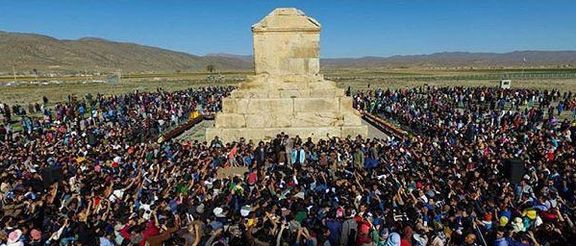
Iranian security officials uttered a sigh of relief probably as October 29 came to an end and the long autumn day in Dasht-I Murghab plunged into dusk quietly.
The day coincided with Cyrus the Great Day, the founder of Iran's ancient dynasty, the Achaemenids, whose empire-building in the 6th century BC was marked with respect for diversity and human rights. His empire expanded from Central Asia and the eastern wing of the Persian plateau and beyond to Mediterranean shores and North Africa.
Cyrus the Great (circa 600-530 BC) Day on October 29 this year was relatively uneventful. However, security measures were deliberately visible in Shiraz, the nearest big city to the monument that is the ancient King's tomb in Pasargadae, some 60 miles into the mainly arid plain northwest of the city. The date was chosen based on estimates that he captures Babylon on October 28 or 29 in 539 BC.
Security police were vigilant in Shiraz since Thursday, questioning anyone who looked like a tourist to make sure that they were not going to visit Pasargadae, said eyewitnesses in Shiraz.
Friday morning, security forces arrested the parents of Navid Afkari, whose unfair trial and execution in 2019 caused havoc in Iran. The elderly parents were arrested with a birthday cake with the face of Cyrus the great painted on it with icing. Reports from Iran say they were released in less than two hours, after being warned to make sure that they will not be part of any demonstration to mark the royal birthday tow weeks before the anniversary of the 2019 protests during which security forces killed hundreds of peaceful demonstrators.
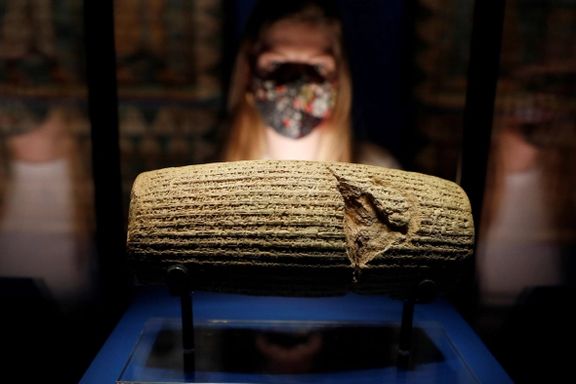
The reason for tight security measures in Shiraz and the road to Pasargadae was concern on the part of the authorities that like previous years, thousands would defy security measures and show up around the ancient King's tomb. The Islamic Republic has shunned Iran's long-standing history of thousands of years of monarchy as if it did not exist as an empire that ruled over most of the known world.
Another reason was that Prince Reza Pahlavi, the heir to Iran's monarchy, sent a message to the nation to mark the day. He called on Iranians: "Remember the name and memory of Cyrus the Great in any which way you can, wherever you are. Show the world that you are a united, freedom-loving and tolerant nation. Every one of you should represent the great ancient nation of Iran. The world should not identify Iran with the ruling criminal cult that is running the Islamic Republic."
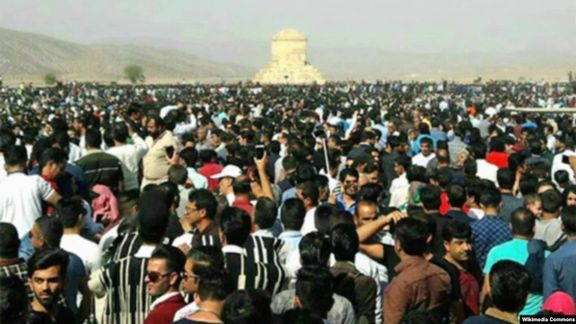
The current regime has been in denial of the popularity of Iran's monarchy and national heritage. Some religious zealots wanted to ruin the monuments in Pasargadae and Persepolis immediately after the 1979 Islamic Revolution, but people's resistance against fundamentalism did not allow them to do what they wanted.
Nonetheless, as recently as two weeks ago, President Ebrahim Raisi made a gaffe during a visit to Persepolis saying that the monuments were reminiscent of oppressor kings. He made the comment mindless of the fact that Cyrus the Great is internationally respected as a champion of human rights.
In a video posted on social media, Princess Ashraf Pahlavi, the twin sister of Shah Mohammad Reza Pahlavi, is seen donating some ancient works of art to the United Nations that testify to Iran's leading role as an advocate of human rights thousands of years ago.This was in sharp contrast to the anti-human rights image of the Islamic Republic most recently portrayed by the UN Rapporteur for Human Rights in Iran Javid Rehman.
Last week, when Cultural Heritage and Tourism Minister Ezzatollah Zarghami called for digging water wells around Cyrus the Great's tomb, an act that would harm the monument, social media users such as cultural activist Mohammad Bagher Tabatabai warned Zarghamithat "The tomb of Cyrus the Great has a place in the heart of every Iranian. You can never destroy it."
Outside Iran, former US deputy assistant secretary of state Len Khodorkovsky wrote in an October 29 tweet: "Cyrus the Great is a source of pride for the Iranian people. His legacy of openness and tolerance will outlast the corruption and brutality of the temporary regime in power today, and usher in a new Iranian renaissance. "
During the past years, particularly after the 1979 Islamic revolution and despite the Islamic Republic’s violent crackdown on pro-monarchy demonstrations, thousands of Iranians rushed to Pasargadae to pay tribute to the great ancient king. The celebration found epic dimensions since 2016. Since 2017, the Revolutionary Guard (IRGC) has deployed forces to the region and blocked all roads to Pasargadae to make sure that the celebrations were not going to happen. But still, hundreds of young men and women somehow managed to gather around the monument and sing patriotic hymns.
In the absence of reliable reports from Iran, particularly about events the government does not want to be highlighted, it is extremely difficult to verify the date and authenticity of pictures that show gatherings around the monument with some paying their respect to Cyrus by kissing his burial ground. The celebration this year may have not been as monumental as previous years, but Iranians trended Cyrus' name as hashtags in Persian and English in the king's remembrance day.
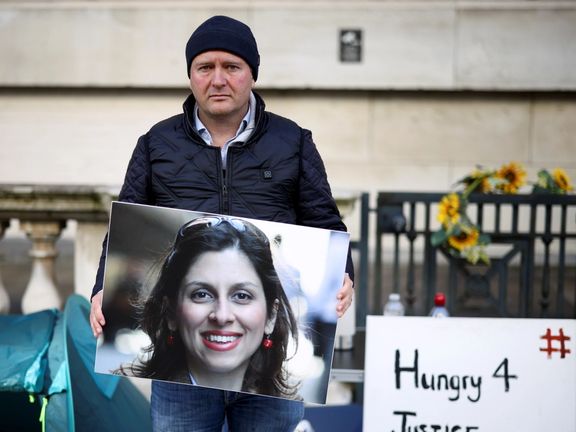
Richard Ratcliffe whose wife Nazanin Zaghari-Ratcliffe again faces prison in Iran, has said he will continue his hunger strike until Britain secures her return.
Ratcliffe − who has encamped since Sunday in a tent outside the entrance of the foreign office in Whitehall, London − met Thursday with Liz Truss, the foreign secretary, and Tulip Siddiq, the member of parliament for Ratcliffe’s north London constituency of Hampstead and Kilburn.
“Going on hunger strike is the absolute last resort for anyone, and Richard told me that he feels there is no other option left, because he feels our government’s response to his wife’s case has been pitiful,” Siddiq said ahead of the meeting.
Ratcliffe went on a 15-day hunger strike in 2019, which he claims led to the couple’s daughter returning from Iran, where she was staying with grandparents.
Zaghari-Ratcliffe, who had worked for the BBC World Service Trust training ‘citizen journalists’ and for Reuters-Thomson Foundation, was sentenced in April to a year in jail after conviction for spreading “propaganda against the system.” She previously served around two years of a five-year term, following conviction in 2016 on spying charges, before being given a series of furloughs.
Zaghari-Ratcliffelost an appeal against the recent sentence in September. “Instead of threatening to return Nazanin to prison Iran must release her permanently so she can return home,” the British Foreign Office said in a statement.
On Wednesday Zabihollah Kohdaeian, spokesman of the Iranian judiciary, said the one-year sentence was final but had not been referred for enforcement.
Ratcliffe insists UK ministers are "too timid" in efforts on behalf of his wife and has repeatedly linked the case to the British government’s failure to repay £400 million ($550 million) owed to Tehran after failing to deliver Chieftain tanks in the 1970s.
Ratcliffe’s disquiet with the British prime minister Boris Johnson goes back to 2017 when Johnson, then home secretary, told parliament that Zaghari-Ratcliffe was training journalists in Iran, a claim Johnson later retracted but which was cited in the legal case in Tehran.
Ratcliffe has recently charged that his wife’s plight has been considered less important than talks in Vienna designed to revive the 2015 agreement restricting Iran’s nuclear program.
“My criticism of the British government is they’ve not prioritized the safety of British citizens in the course of their nuclear negotiations, in the course of their discussions with Iran and other stuff’s been more important,” he told the BBC.
“Iran conducts its diplomatic business through hostage-taking, in part because it is cost-free,” he told the Guardian 19 September.
Former foreign secretary Jeremy Hunt told parliament Wednesday that Zaghari-Ratcliffe would not be able to leave Iran until the UK government returned the money paid for the tanks. "When are we going to repay that debt?” he asked.
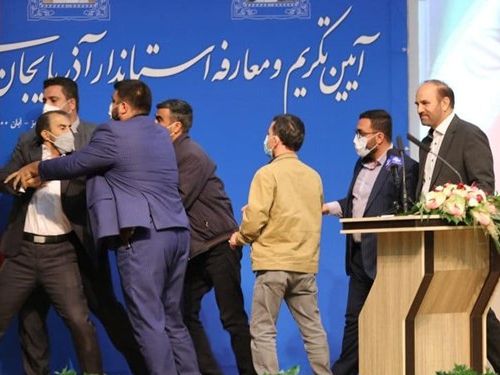
The IRGC officer who slapped a general last week in Iran is under pressure in military detention to confess that his action was based on personal reasons.
The Human Rights Activists’ News Agency (HRANA) a monitoring group based abroad quoted “an informed source” on Friday that a court set his bail at 3 billion rials ($11,000) but outside pressures have kept the assailant behind bars.
The Revolutionary Guard colonel identified unofficially as Ayyub Alizadeh, walked on the stage on October 23 during the inauguration of a new governor, General Abedin Khorram, and slapped him hard in the face. The reason for his daring act has never been officially disclosed, but some have said he was angry that Khorram had denied him a promotion.
Official media reported that he was angry for a personal reason unrelated to Khorram. According to HRANA, interrogators are now pressuring him to make a confession along those lines.
The unidentified source told the human rights monitoring group that Alizadeh is under pressure and might have even been beaten to make a false confession.
Despite censorship, Iranian media did report the incident, which was an embarrassment for the Revolutionary Guard.
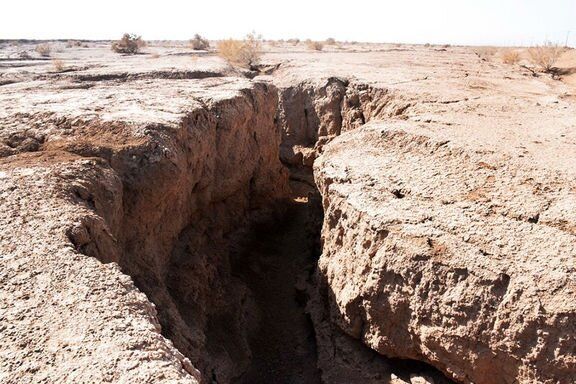
Iran’s natural disaster taskforce says 20 million urban residents face ground subsidence in 18 of 31 provinces, warning about agricultural overuse of water.
Ali Baytollahi, the head of the taskforce said Iran has not come up with policies and rules to deal with the disaster, as drought and wasteful irrigation methods are depleting ground water reserves.
Depletion of underground water is one of the main causes for ground subsidence that can threaten not only cities but also agricultural lands.
Iran’s capital city Tehran is facing a serious problem of rapid ground subsidence due to decreasing ground water levels, Intel Lab intelligence an imagery consulting firm reported July 1.
Intel Lab published a series of satellite imagery showing relative levels of sinking ground between January 2020 and April 2021. In some areas the ground has sank up to 25 centimeters or more than 8 inches.
Reports and images showed in early October that international airport and historic buildings in Esfahan are sustaining damage from sinking land, as a result of over-reliance on ground water for agriculture amid recurring droughts.
Baytollahi has said that if Iran does not take serious action now, the country can soon reach a point of no return.